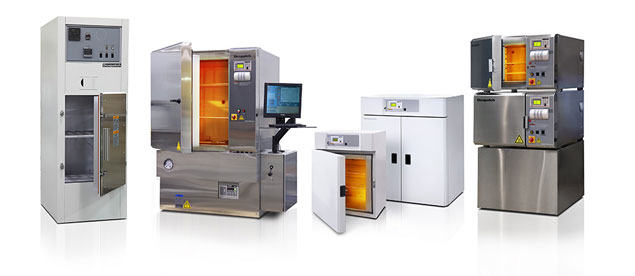Lab ovens are standard equipment in many labs. They provide uniform temperature and precise temperature control in medical, forensic, application, pharmaceutical, electronics, research laboratory, and material processing situations. Lab oven temperatures range from ambient to over 300°C (572°F). Often, new lab ovens pay for themselves quickly while providing customers superior quality products.
Critical considerations when choosing a lab oven are type, application, size, volume, temperature requirements, heating uniformity, airflow, and cleaning and maintenance. Additional considerations are energy consumption, efficiency, and budget. Several oven types fit into this product category. They include digital, analog, heavy-duty, high temperature, vacuum, forced air convection, and gravity convection ovens.
Below are the top six laboratory oven suppliers in the United States.
1. Despatch Industrial Ovens

Despatch is an international supplier of lab ovens. Known as a global leader in this product category, the company features a full line of lab ovens that include the
- LBB Laboratory Ovens
- LAC High Performance Laboratory Ovens
- LCC/LCD Clean Process Lab Oven
- LFC Class A Laboratory Oven
- Qmax Laboratory Oven for Testing
- RBC Laboratory Oven for Burn-in
These lab ovens provide highly reliable operation, superior uniformity, maximum versatility, and consistent results. They feature sturdy, welded, double-wall construction, thick glass fiber insulation, and heavy-duty door gaskets and carry a five-year warranty on their heating elements.
For flammable solvent applications that involve flammable solvents, the company offers Class A lab ovens with a pressure relief panel, purge timer and exhaust fan to meet NFPA 86 requirement.
Headquarters:
8860 207th Street
Minneapolis, MN 55044
Website: www.despatch.com
Phone: 952-469-5424
Toll-free: 1-800-726-0110
2. Grieve

Grieve Corporation has a history of producing long-lasting, high-quality ovens for a wide variety of industries. The company has been making ovens since 1943. Grieve produces low-cost, fully equipped lab ovens for drying, baking, annealing, conditioning, sterilizing, evaporating, dehydrating, and general laboratory work.
Heat in Grieve’s ovens comes from the bottom up through the oven chamber by natural convection. It exists through vents in the top of the oven. The maximum temperature for Grieve lab ovens is 518F (270C). Grieve Corporation also produces custom lab ovens tailored to specific worksites and requirements.
Headquarters:
500 Hart Road
Round Lake, IL 60073-2898
Website: www.grievecorp.com
Phone: 847-546-8225
3. Quincy Lab

Quincy Lab is known for its experience and expertise in crafting dependable lab ovens. It manufactures all its ovens in-house using state-of-the-art CNC equipment and software solutions. Quincy manufactures both analog and digital lab ovens as well as low-temperature lab ovens. Plus, it manufactures lab oven replacement parts and optional equipment.
Quincy’s GCE (Digital Gravity Convection) and AFE (Digital Air Forced) series lab ovens meet the needs of industry, research organizations, and schools. Its lab ovens are ideal for a wide variety of applications, including part drying, baking, curing, sterilizing, evaporating, heat treating, annealing, and testing.
Headquarters:
1928 N Leamington Ave
Chicago , IL, 60639-4421
Website: quincylab.com
Phone: 1800-482-4328
4. Sheldon Manufacturing
![]()
Sheldon Manufacturing is an ISO 9001:2015 certified manufacturer of high-quality and innovative constant temperature equipment. The company’s Shel Lab Oven series products provide fast heating, temperature recovery, uniformity for drying, baking, and curing needs.
The series includes vacuum, gravity convection, high-performance, and forced air lab ovens. Shel’s cleanroom ovens have all the critical features these types of ovens need, such as a fully welded stainless steel interior, two adjustable perforated stainless-steel shelves, rapid heat recovery, and two separate LED digital displays for time and temperature.
The displays offer both setpoint and up-to-the-second readings.
Headquarters:
300 N. 26th Avenue
Cornelius, OR 97113
Website: www.sheldonmanufacturing.com
Phone: 503-640-3000
5. Yamato Scientific America

Yamato Scientific America is located in the heart of Santa Clara, CA. Founded in 1989, it provides general laboratory products to the US marketplace. It offers an extensive line of reliable lab ovens, including natural convection, forced convection, fine, vacuum, and inert gas laboratory ovens.
Its laboratory cleanroom ovens include a forced convection Class 100 unit and a large capacity forced convection Class 100 oven. It also offers natural convection and forced convection incubators as well as laboratory furniture, including fume hoods, clean benches, and fume hood exhaust gas washers. Yamato Scientific America is a wholly-owned subsidiary of Yamato Scientific.
Headquarters:
925 Walsh Avenue
Santa Clara, CA 95050
Website: yamato-usa.com
Phone: 800-292-6286
6. Thermo Scientific

Thermo Scientific is an industry-leading brand of Thermo Fisher Scientific. Thermo Scientific provides heating equipment designed to ensure exceptional performance, safety, efficiency, and consistent results. The US-based company’s full line of lab-oriented products includes heating, drying, and vacuum ovens, lab furnaces, lab box furnaces, and lab tube furnaces.
Thermo Scientific also offers wireless monitoring solutions for heating equipment, hybridization ovens, lab centrifuges, lab shakers, and lab oven and furnace accessories. The company designs its ovens and furnaces to deliver consistent results across all applications—from drying delicate samples or everyday labware to performing high-quality tests in manufacturing processes.
Headquarters:
168 Third Avenue
Waltham, MA USA 02451
Website: www.thermofisher.com
Phone: 781-622-1000
What are Ovens Used for in a Lab?
Lab ovens are ideal for a wide range of laboratory processing applications. Typical applications include removing moisture from samples in environmental, biological, and clinical settings, eliminating bacteria or microorganisms from electronic or medical products, strengthening metal or glass, and evaporating excess solvents, such as water, from a solution to produce a concentrated solution or measure their melting point.
Additional lab oven applications include drying glassware, sample drying, melting, chemical reactions, and die-bonding, a manufacturing process for attaching semiconductor die to its packaging or some substrate. Other applications include space systems because of the oven’s ability to improve bond strength between materials, sterilizing equipment used in operations, and developing fingerprints in forensics applications.
Researchers expect the global lab oven market to grow at a CAGR of 4.6% from 2019 to 2027. Driving the demand for lab ovens are blood banks and food testing facilities.







